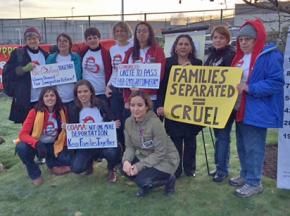Our message: Not one more
reports on a protest at the Northwest Detention Center, where immigrants have staged a hunger strike in opposition to the conditions of their detention.
APRIL 5 was a national day of action to demand an end to deportations. Sometime in April, the Obama administration will pass a grim milestone: 2 million deportations since it has been in office.
As part of the national day of action, several hundred people rallied at the Northwest Detention Center in Tacoma, Wash., accompanied by the "Artesian Rumble," a makeshift band from nearby Olympia. The action consisted of making signs and writing letters to detainees, followed by workshops related to conditions detainees face.
Demonstrators then formed a picket line on the street in front of the center. Chants rang out during the march--the most frequent was: "No estan solos!" (You are not alone). Finally, a rally was held which featured former detainees and families of present detainees telling the stories of the problems they face under present detention and deportation policies.
The Northwest Detention Center is managed by the GEO Group, which bills itself as the largest provider of detention services in the world.

GEO profits off of detainees in several ways First, there is a guarantee that the center is kept full. If not, the government must pay a fine to GEO. Additionally, many detainees work at the facility, but are paid just $1 per day, saving GEO money it would have to pay to outside workers.
Detainees also must buy everything except regular meals from the center's commissary, where prices are inflated far above the outside market. There are phones at the center, but detainees are not allowed to use their own phone cards for them--they have to buy cards from GEO with jacked-up prices.
The average stay at the center is around seven months, but if a detainee contests his or her detention, it can take much longer to get a hearing. Once a hearing is held, immigrant rights advocate Angelica Chazaro explained how the cards are stacked against the detainee:
Violations of immigration law are civil infractions. Detainees are entitled to an attorney, but one is not provided as would be the case under a criminal charge. Consequently, about 90 percent of detainees are without legal representation. The government, on the other hand, is represented by an attorney called a trial attorney. The trial attorney acts much as a prosecutor does in a criminal proceeding. Immigration judges are commonly former trial attorneys. So the judge at the hearing is often a person who has spent his or her career trying to get immigrants deported.
TO PROTEST these conditions, an estimated 1,200 detainees at the detention center began a hunger strike on March 7. A former detainee and organizer of the hunger strike gave some background at the April 5 rally, stating, "On February 24, I was being taken in a van with some others to the immigration office in Tukwila. As we passed the main gate, we saw several people who had chained themselves to the fence. We thought that if they were willing to do that to support us, we should do something to support them."
After the hunger strike began, several of the strikers were put in solitary confinement. Facility operators claim that this was done because some detainees complained that they were being "intimidated" into striking.
However, the evidence points to a different story. A Tacoma journalist managed to interview striker Ramon Mendoza while he was in solitary. He was wearing a blue uniform, which is assigned to detainees who are not violent. Other strikers report that they were simply pulled out of their rooms and put into solitary.
Detainee Hassall Moses, an Army veteran who has now spent more than 21 months at the detention center, tried to print and circulate a letter urging a work stoppage among prisoners to supplement the hunger strike. However, the letter was intercepted by facility staff, and he was immediately whisked into solitary.
"Basically this facility is run by the detainees," Moses told a lawyer in a recorded interview, "and if everybody stopped working, we could negotiate a pay raise, because right now, everybody is working for a dollar. We could talk about the quality of the food, the living conditions." Moses is reportedly being charged with "misusing machinery" by prison officials.
Ultimately, the American Civil Liberties Union sued to have the detainees released from solitary. ACLU lawyers reported that all were back in the general population as of April 4.
The rally ended with a firm determination by advocates to continue the fight to end deportations. The slogan "Not one more" will continue to be heard.


